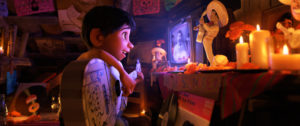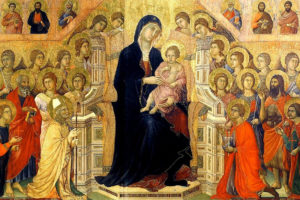Coco was probably one of the best films I’ve seen this year. The animations and cinematics were just mind-blowing. If I remember correctly, a special sneak peek at Disney California Adventure mentioned that there were more than 8 billion lights used in the Land of the Dead scene–CRAZY. Also, I grew up with folks that honored Dia de los Muertos (Day of the Dead). While I wasn’t involved with the festivities, it was a treat to finally learn more about the heritage that runs from generation to generation. But what really drew me to the film was the familial conflict that occurs within the movie. While what I’ll mention has already been made available in previews and won’t spoil the movie.
The film is based upon a child named Miguel who is on a journey of self-discovery. Almost similar to any “first” superhero movie, there is a motivation, interest, or desire that directs the main character into the many situations that he or she gets themselves into. For Miguel, it’s music. Unfortunately, music is not welcomed into Miguel’s household. In fact, music hasn’t been welcomed for many generations.

NO MUSIC ©2017 Disney•Pixar. All Rights Reserved.
Some past family members had issues with music and decided to go into another business that has been ongoing for multiple generations. However, Miguel still feels like there’s a calling for music in his life and despite his family’s view on music, he pursues this desire in secrecy.

HIDDEN TALENT ©2017 Disney•Pixar. All Rights Reserved.
Here is where I will stop revealing anymore of the plot and mention why I’m drawn to the family conflict more so than any other influence of ancestral worship. I’m glad that my congregation hasn’t been too affected by Dia de los Muertos. In fact, I think film was good at not overbearing the holiday. It seemed like Dia de los Muertos was used more so to set up theme and setting rather than convincing with it’s own apologetic.
As a minister I would say that most of my pastoral care revolves around the topic of calling. Similar to Miguel’s situation, many folks have been approaching life by seeking counseling and wisdom from myself and other staff. At the root, it’s not about what they’re doing. They’re seeking why. I think that if we know the end goal of our duty or task, we would be more inclined to either stick with it or stop and do something else. Furniture stores like IKEA have showrooms to present the potential of their products. But the hard part is assembling it yourself.
Many times, we don’t really know our end goals. For guidance, our human nature tends to clutch onto whatever is close at hand–in the case of Miguel– it was his heart. But as we all know, given enough time our hearts will become influenced by something. Whether it’s the joys and burdens of work and family or the hope of Scripture written on our hearts, the root of our actions will come down to our heart convictions. In the film, Miguel has this feeling in his heart that tugs him towards music, which quickly leads to disobedience to family and the law. His feelings leads him into hiding and delinquency.
The question at hand seems to be along the lines of, “How far will you go to follow this feeling?” While a common response is to express one’s own individual desire, sometimes those feelings should be reconsidered or pardoned. Because of Miguel’s own desires, he challenges the wisdom and values of past generations, which leads him into a perilous predicament.
We can quickly see how this may influence one’s spiritual walk as well. I’ve had my fair share of cultural contentions at church, as the values of the first-generation Korean immigrant culture sometimes conflict with the second-generation more Americanized values. Being at my congregation has taught me to appreciate the differing spiritualities of both cultures. While I may not understand some cultural traditions such as early morning dawn prayer services at 5 AM, I’ve come to realize that these dawn prayer gatherings have been so impactful in the lives of this immigrant church where it’s become the pulse and the furnace for the church. I honestly have a hard time waking up that early, and often lack motivation to attend those prayer gatherings, especially since I don’t understand the language. However, I’m encouraged by the many faithful prayer warriors of our church who make a commitment to start their day in prayer. If I were to dismiss the values of the first-generation culture, it would be an act of disrespect for a culture that has guided them towards a cultural lifestyle of prayer.
There are also conflicts between the values of the first generation immigrant culture who left their home country to pursue a better future for their families. In this way, they often want their children to pursue careers that offer stability such as being a doctor, lawyer, engineer, or business person. They also emphasize being loyal to family, and continuing to maintain family honor through their achievements. However, as the second-generation is often more influenced by the Western individualized culture of following one’s own passions and desires, that may not lead into a life of stability as their parents would like, conflict ensues. As the second-generation tries to figure out their calling, they are often conflicted with these differing values. There is often wisdom from the first-generation that the second-generation misses in trying to pursue their own path. Yet, there also may be a lack of openness and trust from the first-generation in empowering the second-generation to seek their own calling.
Final Thoughts
As mentioned earlier, Coco was definitely a great movie. The film introduced a whole new tradition that was inclusive but not overbearing. Besides the actual holiday, much of the narrative was driven by fame and music. The movie also showed the conflict between following the values and traditions of the past, and following one’s own passions and destinies. This movie showed how this journey is a difficult road to navigate. Since I don’t want to spoil the movie, I won’t discuss how it ends, but it did help me have a greater appreciation for the values of the past, which helps shape the future. Coco shows how bridges can be built between different cultures and generations, as each show a greater appreciation for each other.





Leave a Reply
Your email is safe with us.